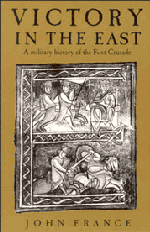Book contents
- Frontmatter
- Contents
- List of figures
- Acknowledgements
- List of abbreviations
- 1 The roots of victory
- 2 War in the West
- 3 Campaigns, generals and leadership
- 4 Preparations and prelude
- 5 The size of the crusader army
- 6 The first enemy: the Turks of Asia Minor
- 7 The second enemy: the siege of Antioch
- 8 The siege of Antioch: crisis and delivery
- 9 The siege of Antioch: victory
- 10 Divisions
- 11 Jerusalem: triumphant ending
- 12 Perspectives
- Appendix: A note on the sources
- Select bibliography
- Index
11 - Jerusalem: triumphant ending
Published online by Cambridge University Press: 03 May 2011
- Frontmatter
- Contents
- List of figures
- Acknowledgements
- List of abbreviations
- 1 The roots of victory
- 2 War in the West
- 3 Campaigns, generals and leadership
- 4 Preparations and prelude
- 5 The size of the crusader army
- 6 The first enemy: the Turks of Asia Minor
- 7 The second enemy: the siege of Antioch
- 8 The siege of Antioch: crisis and delivery
- 9 The siege of Antioch: victory
- 10 Divisions
- 11 Jerusalem: triumphant ending
- 12 Perspectives
- Appendix: A note on the sources
- Select bibliography
- Index
Summary
Just as the crusade was about the leave ‘Akkār in considerable disarray on 13 May 1099, there occurred an event of great importance for the coming campaign. Their ambassadors to Cairo finally returned with proposals from the Fatimid Caliphate. The leaders had first dispatched envoys to the Egyptians from Nicaea in late June 1097 at the suggestion of Alexius and we have seen that some kind of understanding was reached, or at least anticipated, after discussions between the leaders and a Fatimid embassy in February–March 1098 which returned home with a crusader delegation. According to Ekkehard these Franks were in al-Afdal's camp before Jerusalem during his siege of the city when he threatened its defenders with his Frankish allies; the Historia Belli Sacri simply says that they spent Easter 1099 in the Holy Sepulchre obviously on friendly terms with their hosts.2 This strongly reinforces the idea that the Egyptians were negotiating seriously. Raymond of Aguilers makes it clear that a partition of land captured from the Seljuks was the basis of discussion, with Jerusalem being allocated to the Franks, and the Historia Belli Sacri suggests the same kind of arrangement. It is difficult to know how serious the crusaders were in pursuing these negotiations by this time.
- Type
- Chapter
- Information
- Victory in the EastA Military History of the First Crusade, pp. 325 - 366Publisher: Cambridge University PressPrint publication year: 1994



